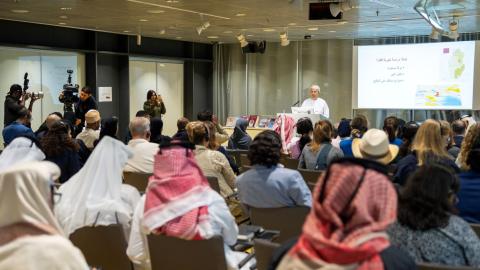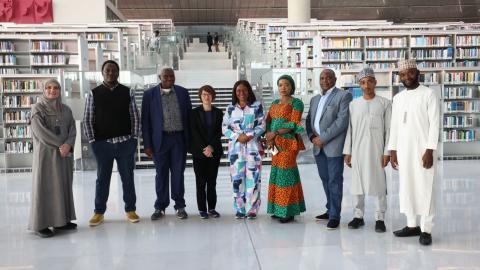
Schools and universities around the world have closed their doors since the outbreak of the COVID-19 pandemic. Campuses, classrooms and libraries remain empty as a measure to ensure the health and wellbeing of everyone connected to the educational sector.
In Qatar, studying and research have not shut down altogether. Thanks to a vast range of sophisticated online resources that support learners of all ages, from nurseries to schools and higher education institutions, Qatar National Library is able to play its part in assisting students at Hamad Bin Khalifa University (HBKU), as well as other universities and schools across Qatar, to continue their research and studies without interruption.
All classes on the HBKU campus were suspended on 10 March until further notice, and the transition was made to online learning. With students’ needs paramount and HBKU’s determination to ensure academic progress under these unprecedented circumstances, having access to a major selection of online resources is a genuine advantage.
HBKU students registered as members can access the Library’s online resources in various formats, including e-books, academic papers, audiobooks, newspaper articles, magazines, streaming music and videos. Registration is easy and fast, and can be done online at https://www.qnl.qa/en/library-services/become-a-member.
Once a member, students have access to more than 190 databases, beyond 600,000 e-books, 16,000 journals, and more than 465,000 reports, theses, dissertations, among others. A raft of subjects, including arts and humanities, education, health sciences, law and political science, religion and philosophy, social science and history, are all available via the Library’s online databases.
The Library is harnessing the power of technology to ensure that students are connected to a librarian at all times. Students in need of assistance to find the right academic articles, e-books, create a bibliography or schedule a research consultation with a subject area librarian can send their questions via the Library’s “Ask Our Librarians” online service: https://www.qnl.qa/en/ask-qnl-librarians.
Dr. Emad El-Din Shahin, Interim Provost at HBKU, said: “This pandemic is something that hardly anyone could have been prepared for. Yet, it has also shown us the uniqueness and strength of Qatar Foundation’s Education City environment. HBKU’s closeness to Qatar National Library in upholding educational continuity, academic excellence, and innovation, is a logical and direct reflection of our shared mandates to foster knowledge, build capacity and
bring the community together. I encourage everyone at HBKU to make optimal use of the Library’s online resources, that indeed are second to none in the region.”
Patrice Landry, Chief Librarian and Deputy Executive Director at the Library, said: “Our digital resources can fill a massive gap left by the sudden closure of educational institutions and we are glad to help students find ways to ensure the continuity of their learning experiences. We welcome students from HBKU and other universities, as well as schools across Qatar, who will find a supportive team of expert librarians ready to support remotely during this extraordinary period. Our online resources cover a whole range of subjects, and researchers, students, faculty and staff can source academic papers, e-books, or journals, which can make that vital difference when it comes to completing their work remotely.”
The Library’s digital resources also include a Consumer Health Database, particularly tailored to students in Health Sciences. It includes journals and magazines covering a wide range of health subjects including sports injuries, women’s health, nutrition, midwifery, dentistry, and eye care. There also is a religion database, covering formal theological studies and commentary on topics of general interest from the perspectives of most religious confessions.
Another useful resource available is the ProQuest Science Database, a definitive resource for researchers studying both, applied and general sciences. It contains features dating back to the 1980s with more than 1,200 documents available in full text.
The latest issues of globally leading magazines, such as The New Yorker, Newsweek, the Economist, and Wired, are also free to access.
Mahmood Ali Dari, a student at HBKU’s College of Islamic Studies, said: “It was challenging at first when the campus suspended classes, but we all completely understood why. The health of everyone overrides everything now. However, we all want to continue our studies in some way as we have been working so hard towards our degrees, so the online resources provided by the Library are really ideal. Such support is fantastic during this time and something I will certainly continue to use.”
To access the Library’s online resources, visit here: https://www.qnl.qa/en/explore/online-resources







